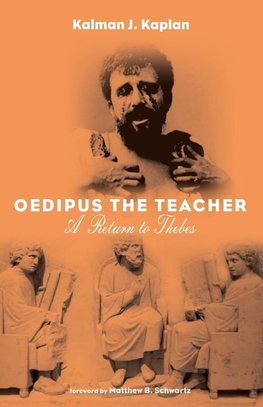
-
 Anglický jazyk
Anglický jazyk
Oedipus The Teacher
Autor: Kalman J. Kaplan
In Oedipus in Jerusalem, the biblical prophet Nathan meets blind Oedipus wandering alone outside of Thebes, becoming convinced that Oedipus has been entrapped by misleading information. He brings him to trial at the Jerusalem Sanhedrin, where Oedipus is... Viac o knihe
Na objednávku
19.62 €
bežná cena: 22.30 €
O knihe
In Oedipus in Jerusalem, the biblical prophet Nathan meets blind Oedipus wandering alone outside of Thebes, becoming convinced that Oedipus has been entrapped by misleading information. He brings him to trial at the Jerusalem Sanhedrin, where Oedipus is acquitted of intentional patricide and incest, but won't accept his acquittal. Oedipus Redeemed describes attempts by Nathan and Sophocles to help Oedipus accept his acquittal, and his self-induced blindness, in the process reuniting him with his daughter Ismene. Oedipus returns to the Sanhedrin, where he agrees to try to emotionally accept the acquittal he has received
In this third play, Oedipus the Teacher, Oedipus returns to Thebes with Ismene to teach the lessons he has learned in Jerusalem with the help of a Greek assistant, Kallias, recruited by Sophocles. Oedipus contrasts the destructive results of Greek riddles with parables emergent in biblical narratives. Kallias falls in love with Ismene and becomes rivalrous toward Oedipus, reflecting a distorted Greek view of relations between fathers (older men) and sons (younger men). Several biblical stories are offered as antidotes. Oedipus comes to live with Ismene and Kallias and becomes a doting grandfather. The play ends with the announcement that Oedipus's course is chosen to be taught all over Greece. Oedipus states that he is finally happy.
""It is a tour de force. I wonder if any other active person could write such a work, exhibiting the command of the gamut of Jewish and Hellenistic teachings. Kaplan considers both Greek and Jewish traditions, cloaked in a dramatic context, but focuses mainly on Judaism's profound ideas. Moreover, as he has done in major previous contributions, Kaplan explores the nature and meaning of the Judaic weltanschauung for therapy and the person's wellbeing.""
--Daniel Algom, Professor of Psychology, Tel-Aviv University
Kalman J. Kaplan is a Professor in the Department of Psychiatry at the University of Illinois College of Medicine. He has received grants from the John Templeton Foundation and the Fulbright Foundation to develop a ""Biblical Approach to Mental Health."" He has published sixteen books and a hundred articles. Among his books are TILT: Teaching Individuals to Live Together; Right to Die versus Sacredness of Life; The Fruit of Her Hands; A Psychology of Hope; and Living Biblically and Biblical Psychotherapy.
- Vydavateľstvo: Resource Publications
- Rok vydania: 2019
- Formát: Paperback
- Rozmer: 216 x 140 mm
- Jazyk: Anglický jazyk
- ISBN: 9781532686597











 Nemecký jazyk
Nemecký jazyk 
